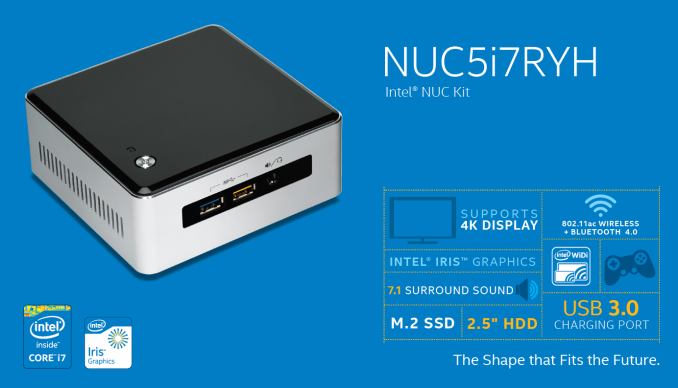Intel NUC5i7RYH Broadwell-U Iris NUC Review
by Ganesh T S on April 20, 2015 8:00 AM EST- Posted in
- Systems
- Intel
- HTPC
- NUC
- Broadwell-U
Final Words
The Intel NUC5i7RYH provided us with the opportunity to take a look at what a higher TDP CPU and Iris Graphics can bring to the table in the UCFF space. Intel is pitching the Iris NUC as a gaming and content creation solution. Based on our evaluation, the Iris NUC seems to provide the best performance per watt in this form factor. The BRIX Pro with the Core i7-4770R is a better all-round solution, but that comes with bad acoustics and higher power consumption. It is also slightly bigger in order to accommodate the necessary thermal solution. The Iris NUC doesn't suffer from those drawbacks, thanks to the use of a 28W TDP CPU in the system.
In terms of scope for improvement, we would like to see a full-sized HDMI port in the back panel. The BRIX PCs are able to accommodate full-sized HDMI ports, so there is really nothing on the technical side to prevent this. If a mini-HDMI port is non-negotiable, it would be good to have either a mini-HDMI to full-sized HDMI adapter or a mini-HDMI to HDMI cable in the package. The design for accommodating the 2.5" drive is better than what we saw in the Haswell NUC. However, the cabling and 2.5" drive slot in the BRIX H series is definitely better. Other improvement aspects that we suggested in the Broadwell-U NUC review are applicable here also.
Minor quibbles aside, the Iris NUC delivers what it promises - decent casual gaming credentials and optimal CPU performance while ensuring that acoustics and power consumption remain reasonable. In fact, it has the best performance amongst all the traditional UCFF PCs that we have evaluated so far.
The final aspect that we talk about today is pricing. The NUC5i7RYH seems to be available on pre-order for $480 on CDW (even though Intel indicated a street price of $500). M.2 SSDs (both NVMe and SATA AHCI) continue to carry a premium. For users wishing to keep the build cost down, the Iris NUC also supports a traditional 2.5" drive. This makes the Iris NUC mini-PC an excellent choice for all budgets.











66 Comments
View All Comments
damianrobertjones - Monday, April 20, 2015 - link
I have the i5 version along with an 850 evo drive and, seeing as it's there, a Plextor M6e M.2 PCIe drive. The Nuc is quite fast but when it comes to using the Plextor PCIe SSD, while running VMs etc, the performance is really quite poor. We're talking the same speed or less than the 850 drive. (Stats obtained from the Samsung Magician software)Heck using video from within a VMWare OS, along with Corel Videostudio, creates stuttering etc. Previously I did the same task with a Surface Pro 3 (i7,8GB) with no such issues.
Is the M.2. spec simply not ready?
CaedenV - Monday, April 20, 2015 - link
That depends a lot on your software and hardware support. For example, before I was running win10 bare metal on my desktop I was running it in VM, and on my nice big Sandy Bridge i7 desktop it could not play back simple h.264 1080p video smoothly... but trying the same thing on my newer but much more gutless i7 dual core laptop a few months later had pretty much 0 issues. It all depends on the VM platform, the OSs in use, the GPU, the drivers, etc.damianrobertjones - Monday, April 20, 2015 - link
I hear you. I just expected more from the PCIe M.2. drive. It simply 'feels' slow and the speed test returns figures that are nowhere near the performance that it should hitFlunk - Monday, April 20, 2015 - link
It might have to do with the controller.extide - Thursday, April 23, 2015 - link
You'r VMDK's are probably not properly 4K aligned.extide - Thursday, April 23, 2015 - link
Your*damianrobertjones - Friday, April 24, 2015 - link
I've moved to an MSI machine with 2x 850 evos. Problem solved and all working fine again.smegma11 - Tuesday, October 13, 2015 - link
I read somewhere to expect great things from the Skylake. The newest chip will open up all 3 data lines to the M.2 where the previous versions don't. I imagine this will help speeds quite a bit.nutternatter34 - Monday, April 20, 2015 - link
I have to agree. I tried to use an M.2 as a boot drive and for my software. Where I might not be able to compare many SSDs in general usage, the M.2 directly hampered multi-tasking and had notable visible performance issues. Maybe I expected too much from it but in future I would be very cautious choosing an M.2 drive over something in the 2.5" form factor.damianrobertjones - Tuesday, April 21, 2015 - link
THANK YOU! Glad that someone's got the same issue.From the Samsung Magician software
Samsung 850 EVO 250GB 2.5"
SR: 547 SW: 504
RR: 71807 RW: 64081
Plextor PX-G128M6e
SR: 743 SW: 332
RR: 64558 RW: 47909
The whole reason for getting one was to have improved performance for my VMs! What's going on? (Not tried to update the Plextor firmware just yet)